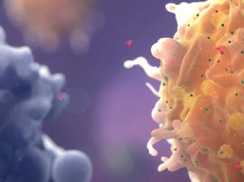Researcher : Dr. Amiram Ariel
Background
Macrophages are specialized immune cells involved in the healing process following inflammatory insults. Macrophage bioactivity can promote the natural resolution of inflammation and so that tissue can return to its normal function. However, microphage bioactivity can also result in tissue fibrosis and irreversible damage to the affected organ. The exact outcome of the inflammatory process depends on the mediators secreted by macrophages during its resolution.
Tissue fibrosis is a pathology that is not adequately addressed by currently marketed drugs.
Drug Development
for Prevention and Treatment of Fibrosis
Lactoferrin (Lf) is a host defense protein found in milk, colostrum, saliva, tears, mucus secretions and leukocyte granules. The Lf protein possess anti-microbial, anti-viral, anti-parasite, anti-inflammatory and anti-cancer activities. Nutraceutical products of lactoferrin are marketed as food supplements.
Research conducted by Dr. Amiram Ariel, head of the University of Haifa's Laboratory for Molecular Pathways in the Resolution of Inflammation, is examining whether Lf-derived peptides generated by macrophages can promote non-fibrotic healing and prevent fibrosis in various organs (i.e., liver, lung, kidney, skin, etc.).
Research Status
Macrophages acquire Lf from apoptotic neutrophils during the resolution of inflammation and process it to shorter fragments. Dr. Amiram's research has found that different Lf fragments associate with the onset and resolving phases of inflammation in murine and bovine models of inflammation. A 17 kDa fragment of Lf is associated with the resolution of inflammation and contains 2 immuno-modulatory peptides. One of these peptides induces an anti-inflammatory and anti-fibrotic mediator secretion profile from human macrophages.
This project addresses a molecular target that has not been previously described. This agent and the signaling pathway it triggers are perceived as novel therapeutic modules for tissue fibrosis.
Potential Applications
The developed end product is expected to serve as a treatment for debilitating inflammatory and fibrotic disorders, such as autoimmune disorders, sepsis, lung, liver, kidney, and skin fibrosis.
Investment & Partnership Opportunities
Carmel Ltd. is seeking potential partners and/or investors in this area.
Related pages:
Amiram Ariel, Dr. researcher page
Preventing Breast Cancer Recurrence


